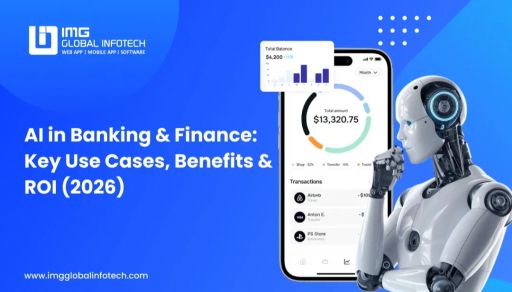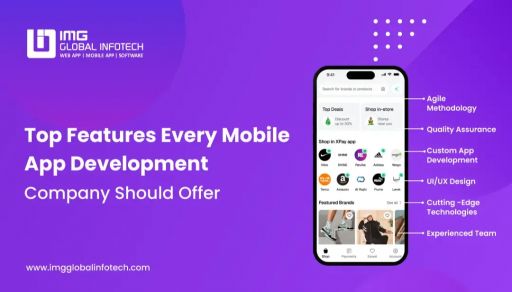How Big Data Is Transforming Mobile App Development
Mohit Mittal
Apr 29, 2019

Have you ever thought about how much data one person generates every second? On average, each user creates around 1.5 to 2 MB of data per second and that number keeps growing every hour.
Now, multiply that by millions of users worldwide. The result? An enormous amount of data. This explosion of data is exactly why businesses are turning to Big Data App Development and Data Analytics App Development to better understand their users and improve services.
As consumer demands evolve, so do business strategies. Today, the impact of Big Data on mobile app development is stronger than ever. Companies are no longer guessing they’re using Mobile Analytics in Big Data to make smarter, real-time decisions based on actual customer behavior.
By combining Big Data with tools like machine learning and analyzing both structured and unstructured data, businesses especially startups and enterprises can gain valuable insights into customer patterns and preferences. This is known as Mobile Analytics Big Data, and it plays a key role in building smarter, more responsive apps.
In today’s competitive digital space, integrating Mobile Big Data Analytics into your Mobile App Development strategy gives you a strong edge. It helps you better understand your audience, personalize experiences, and ultimately outshine your competitors.
As we explore how Big Data is changing app development, it's also important to understand the core concept of Big Data and how it fits into the Mobile App Development Life Cycle.
What Is Big Data?
In today’s digital world, our devices, tools, and even customers are constantly generating large volumes of data. This data is often unstructured, scattered, and constantly changing. That’s where Big Data comes in; it helps businesses handle this raw information and turn it into something useful.
Simply put, Big Data refers to massive sets of information that require modern technologies for collection, storage, and real-time analysis. Traditional data systems aren’t powerful enough to manage this kind of scale and speed. That’s why companies now rely on Mobile Big Data Analytics and Data Analytics Application Development to uncover valuable insights.
The main goal of using Big Data is to make smart business decisions. It helps improve productivity, manage performance, reduce risks, and increase profitability. Businesses can also use it to boost customer satisfaction and deliver better results to stakeholders.
Unlike older systems that only analyze past data, Big Data is built for speed. It processes large volumes of information in just seconds supporting faster and more accurate decision-making.
To fully understand how Big Data powers modern Mobile App Development, it’s helpful to look at its foundation, often explained using the three V’s:
-
Volume – the massive amount of data generated
-
Velocity – the high speed at which data is created and processed
-
Variety – the different types of data, both structured and unstructured
These characteristics are what make Big Data essential for creating apps that are smart, scalable, and ready for future growth especially in line with Mobile App Development Trends and evolving user needs.
The Big Data Umbrella: The Four V’s That Power App Development
When we talk about the impact of Big Data on mobile app development, it all starts with the core principles known as the "V’s" of Big Data. These V’s Velocity, Volume, Variety, and Veracity explain how Big Data works and why it’s so valuable for businesses using Big Data App Development and Data Analytics Application Development.
Let’s break them down:
1. Velocity – The Speed of Data
In the digital world, data is generated at lightning speed. Whether it's from social media, mobile apps, websites, or smart devices, the constant data flow is rapid and continuous. This fast-paced generation is what makes Mobile Big Data so valuable because it helps businesses analyze trends and make real-time decisions. The faster the data is collected and processed, the quicker businesses can respond to customer needs.
2. Volume – The Amount of Data
How much data is being collected? That's where volume comes in. Every second, data flows in from app usage, clickstreams, user interactions, social feeds, and more. In mobile app development, this high volume is essential for generating meaningful analytics and improving app performance. By handling large volumes of data, developers can design better experiences and predict future behavior through Mobile Analytics in Big Data.
3. Variety – Different Types of Data
Data doesn’t come in just one form. It can be text, images, audio, video, or even sensor data. This variety makes Data Analytics App Development more challenging but also more powerful. In Mobile App Development, these diverse data types are organized and structured to extract useful insights, allowing for more personalized and intelligent user experiences.
4. Veracity – The Accuracy of Data
Not all data is valuable. Veracity focuses on the quality and trustworthiness of the data being collected. In Mobile Analytics in Big Data Examples, filtering out low-quality or misleading data ensures that businesses only act on accurate and relevant information. This leads to better decision-making and fewer errors.
How Does Big Data Work in Mobile App Development?
At its core, Big Data follows a straightforward process: Collect → Integrate → Manage → Analyze. This cycle helps businesses turn raw data into valuable insights that drive smarter decisions during the Mobile App Development Life Cycle.
Let’s break it down step by step:
1. Collect – Gathering Data from Multiple Sources
Data is collected from various platforms, mobile apps like YouTube, Facebook, Instagram, Twitter, and even through phone calls or messages. These sources generate massive amounts of Mobile Big Data, which form the foundation for smart, insight-driven app development.
2. Integrate – Making Sense of the Data
Once collected, the data is processed and organized so business analysts can understand it clearly. For example, if you spend a few seconds browsing an item on an eCommerce app and later see related recommendations, that’s Mobile Analytics in Big Data at work. This stage helps app creators personalize the user experience based on real-time behavior, an important part of Data Analytics Application Development.
3. Manage – Storing Data Securely
Collected data is stored securely either on the cloud or on-premise systems. This step ensures that the data is accessible, safe, and easy to retrieve when needed for future analysis or app updates. Proper mobile app data management also supports faster decision-making and lowers data loss risk.
4. Analyze – Turning Data into Insights
Finally, the stored data is analyzed using advanced tools and techniques. This helps businesses identify patterns, predict customer behavior, and discover new opportunities. It's a crucial part of Mobile App Development Trends, helping companies stay competitive and innovative.
Understanding how Big Data works is essential before diving deep into its role in app development. Without proper analysis, raw data holds no value. But with the right process, it becomes a powerful tool to fuel growth, improve features, and support mobile app monetization models.
Role of Big Data in Mobile App Development
Why do people love using mobile apps? It’s simple, they're fast, user-friendly, visually appealing, and meet their needs perfectly. But the truth is, not every app delivers this level of experience.
To build successful apps, companies need more than just good design, they need a smart strategy. That’s where Big Data App Development comes in. The impact of Big Data on mobile app development goes far beyond just collecting and analyzing data.
Big Data Consulting plays a key role in strategy formulation, helping businesses understand user behavior, market demand, and app performance in real-time. With powerful insights from Mobile Analytics Big Data, companies can build apps that are bug-free, feature-rich, and highly engaging.
In short, Big Data helps Android app developers and development teams create smarter apps by providing deep insights across every stage of the Mobile App Development Life Cycle.
Let’s explore how Big Data truly transforms mobile app development and why it's essential for modern apps in line with the latest Mobile App Development Trends.
Customer Requirements
The first and most important impact of Big Data on mobile app development is understanding customer needs. To do this, businesses must analyze high-quality data to identify what users actually want.
It doesn’t stop there Big Data can also help estimate the cost of mobile app development, making it easier to plan budgets effectively.
This data is collected from the constant flow we see around us through apps, websites, and digital interactions. Once gathered, it gives companies valuable insights they can use to improve and grow in the current market.
The raw data reflects the behavior of users already using products or services. With this, businesses can include relevant features in their apps to stay competitive.
Big Data also helps companies understand user responses based on lifestyle, location, background, age group, and more. This makes it easier to build apps that are truly user-focused.
Real-Time Data Access
Customer needs are changing rapidly almost every day. They constantly expect new solutions, pushing companies to adjust their strategies and follow the latest Mobile App Development Trends.
To keep up, businesses use Big Data to enhance the mobile app development process. It helps them stay aware of shifting demands and understand exactly what users want.
One key benefit of Big Data is its real-time data analysis, often referred to as in-flight transitory. This allows companies to make quick, data-driven decisions that improve the user experience.
Why focus on customers? Because higher customer satisfaction leads to increased profits. That’s why businesses rely on the right insights to hire skilled iOS and Android app developers who can deliver apps that truly meet user expectations.
User Experience Analysis
Over the past decade, mobile app development has grown rapidly as companies increasingly adopt it to connect with customers. Mobile apps have become the easiest way to engage and interact with users. As a result, businesses are now focusing on a Big Data-powered future that aligns with user needs.
Big Data helps developers understand user behavior more accurately. By analyzing user experiences, developers can identify pain points and work on solutions to improve the app.
With proper analysis, developers can easily add or update features and pages that enhance the user experience. Using Big Data, they streamline the mobile app development process by creating a clear list of user demands and necessary improvements.
Compatible Marketing Strategies
The impact of Big Data on mobile application development goes far beyond building apps. It also includes tracking user needs, likes, shares, comments, subscriptions, and overall behavior. With proper analysis, companies can access accurate data to support decision-making.
Big Data enables businesses to perform competitive analysis and define their target audience more precisely. You may wonder what marketing has to do with mobile app development? The answer is visibility. To reach users effectively, apps must be marketed using targeted strategies and engaging content.
By analyzing Mobile Analytics in Big Data, businesses can understand purchase patterns and demographic data, helping them position their app in the market. It also allows them to identify user trends and adjust accordingly.
The role of Big Data in mobile app marketing includes:
-
Identifying key customer requirements
-
Helping target the right audience and defining how to reach them
-
Personalizing messages based on purchase behavior, demographics, and social activity
-
Transforming mobile advertising strategies
-
Improving pricing, campaign planning, content delivery, and app design
Personalization
Raw data, in its original form, is unorganized and difficult to understand. Big Data helps make it cleaner and more structured, making it easier for developers to work with.
With optimized search and personalized data, developers can identify the right opportunities to add new features and improve the user experience. If needed, they can even test how certain features will perform before launching them.
The impact of Big Data on app development lies in its ability to provide instant, intelligent insights helping mobile app developers create smarter, more personalized apps for better results.
UX Analytics
In mobile app development, it's crucial to focus on design while keeping customer needs in mind. This is where Big Data plays a major role by helping developers understand user behavior and build apps that meet expectations.
The Big Data-powered approach relies on clear data flow to design apps based on real user preferences. These preferences guide developers in shaping better features and more intuitive designs.
Big Data also helps identify common issues or errors users face. Once developers know what users dislike, they can avoid those problems and improve the overall app experience resulting in a more engaging and user-friendly product.
In addition, Big Data provides insight into the cost of mobile app development and helps estimate the overall mobile app development time. This information is useful for planning the development timeline and budget.
Developers can also use Big Data to understand location, usage patterns, and payment preferences allowing them to add features that truly benefit the user. Teams using Mobile Big Data in the development process often deliver more innovative and user-focused apps.
Sales Conversions
What’s the main goal of mobile app development? To increase revenue, solve user problems quickly, and build strong customer connections. There are many reasons businesses invest in apps.
So, where does Big Data come in? It goes beyond just collecting local data. Since mobile apps are used globally or within specific regions, Big Data helps developers understand users across different markets.
By using Big Data in the mobile app development process, developers can create better solutions based on user behavior. This insight also helps them implement effective mobile app monetization models.
Big Data supports analyzing user reactions, studying purchase patterns, and understanding the target audience. Combined with edge computing, an element of Big Data it reduces data distance, improves performance, and cuts transfer costs. This results in better app speed, improved user engagement, and increased conversions worldwide.
Connected Devices
If you’re familiar with IoT devices, you already know they’re shaping the future and they’re here to stay. The impact of IoT on mobile app development is significant, and when combined with Big Data, it opens the door to even more advanced solutions.
IoT supports automation and helps businesses grow by using the power of Big Data technology. It connects devices to mobile apps, making processes simpler and more efficient. This is why IoT app development has become essential for creating smooth and smart user experiences.
So, what’s the role of IoT and Big Data in app development? IoT devices collect real-time user data, which is then analyzed through Mobile Big Data to generate actionable insights. This allows developers to build user-friendly, result-oriented apps that can stand out in the competitive market.
Future of Big Data in Mobile Apps
By the end of 2020, the mobile app industry was expected to generate over $189 billion in revenue. This growth came from the rising number of users and rapid changes in mobile app technology.
Looking ahead, the future of mobile apps is closely tied to digital technologies, especially Big Data. As we've already seen, the impact of Big Data on mobile app development is significant, and it’s clear that this technology is here to stay. It plays a vital role in creating apps that are both advanced and easy to use.
For businesses, investing in Big Data analysis has become a key move. It allows them to handle large volumes of unused data and build apps with strong, valuable features.
When we look at the Mobile App Development Life Cycle, it's easy to see how much developers can gain from Big Data App Development. It improves the development process, enhances user experience, and creates more engaging apps.
With users spending over five hours daily on their devices, companies can gather real-time, raw data that reflects customer habits. This makes Mobile Big Data a crucial part of understanding users and delivering better mobile app solutions.
Endnote
In today’s competitive world, staying ahead means investing in the right technology. That’s why businesses from startups to large enterprises are turning to Big Data to improve the mobile app development process and keep up with the latest trends.
When used effectively, data can drive business growth, enhance performance, boost revenue, and improve customer satisfaction. Leveraging Big Data App Development allows companies to create smarter, more efficient, and future-ready apps.
So, if you want to thrive in the mobile-first world, it’s time to understand the true impact of Big Data on mobile app development.
To learn how to integrate Big Data into your mobile app strategy, get in touch with IMG Global Infotech, your trusted partner in innovative app development solutions.
 AI in Banking & Finance: Key Use Cases, Benefits & ROI (2026)
AI in Banking & Finance: Key Use Cases, Benefits & ROI (2026) How to Choose the Right Gold Investment App Development Company?
How to Choose the Right Gold Investment App Development Company? Must-Have Features for a High-Performance Digital Gold Investment App
Must-Have Features for a High-Performance Digital Gold Investment App Top Features Every Mobile App Development Company Should Offer
Top Features Every Mobile App Development Company Should Offer Top 10 DigiGold App Development Companies In India
Top 10 DigiGold App Development Companies In India
Mohit Mittal is the co-founder of a leading IT company with over a decade of experience in driving digital transformation and innovative tech solutions. With a strong background in software development, Mobile app development, E-commerce, business strategy, and team leadership, Mohit Mittal is passionate about helping businesses scale through technology. When not solving complex tech challenges, he enjoys sharing insights on emerging trends, entrepreneurship, and the future of IT.









